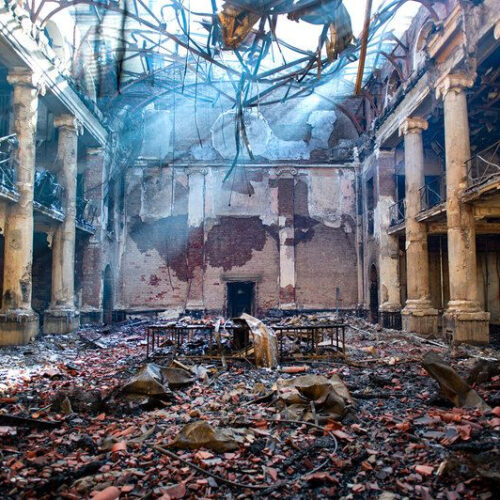

In a recent discussion, celebrated art director Tunji Afolayan addressed the concerns surrounding Netflix’s recent decision to cease funding for Nollywood productions, encouraging the industry to see this as a pivotal moment. Afolayan, who contributed to Femi Adebayo’s acclaimed Netflix series “Seven Doors,” highlighted the challenges within Nollywood and offered potential solutions.
Reflecting on his experience with “Seven Doors,” Afolayan described the project as challenging and fulfilling. “As an art director, my responsibility was to translate the producers’ and directors’ vision into tangible set designs. It was a true team effort, and I take great pride in what we accomplished.”
Afolayan’s sets for “Seven Doors” received high praise for their iconic designs. He explained his creative process: “I dive deep into the script and immerse myself in the story’s world. Collaboration with producers and directors is essential to fully grasp their vision. We crafted several distinct sets for ‘Seven Doors,’ like the Ipebi and the Aganju Shrine, each presenting its unique challenges, but the overall experience was thrilling.”
Having worked on notable projects such as “Jagun-Jagun,” “Amina,” and “King of Boys,” Afolayan expressed that his passion for production design stems from the desire to tell impactful stories. “Set design is vital in storytelling; it’s about creating an immersive atmosphere that captivates the audience and enhances the narrative.”
Addressing Netflix’s funding withdrawal, Afolayan remarked, “This is a wake-up call for our industry. We need to explore local solutions to our distribution obstacles. Relying on international platforms isn’t sustainable. We must work on building our distribution networks and streaming services.”
When discussing the future of Nollywood regarding distribution and marketing, he pointed out the need for infrastructure development. “Investing in our distribution channels, cinemas, and streaming platforms is crucial while strategizing marketing efforts that resonate locally. We must take charge of our distribution and promotion.”
Afolayan also addressed another significant issue: preserving Nigeria’s cultural heritage. “It presents a considerable challenge. The lack of preservation affects our storytelling accuracy,” he said. “As an art director, I strive to creatively represent ancient locations and cultures, which can be demanding but also fosters innovation.”
He provided an example from “Jagun-Jagun,” where his team had to reconstruct a 19th-century village from scratch. “With no authentic locations available, we relied on thorough research and creativity to bring the village to life. It was challenging, but the result was gratifying.”
Afolayan lamented the lack of recognition for behind-the-scenes talent, stating, “The contributions of filmmakers such as art directors and cinematographers often go unnoticed. Our work is crucial to the film’s success, and we must celebrate the entire filmmaking team.”
On the importance of funding in film projects, he stated, “Funding is the lifeblood of production. It influences the scale and quality of each project. Without sufficient financing, realizing a vision is incredibly difficult.”
Reflecting on his career choice, Afolayan shared, “I’ve always been captivated by the behind-the-scenes process of filmmaking. As an art director, I can harness my creativity to bring stories to life in new ways. I enjoy the challenge of creating immersive worlds for audiences.”
Lastly, Afolayan proudly mentioned being nominated for Best Art Direction at the Africa Magic Viewers’ Choice Awards (AMVCA) 2024 for his work on “Jagun-Jagun: The Warrior.”










